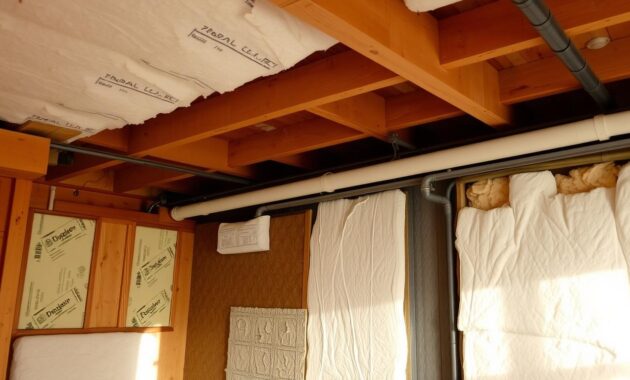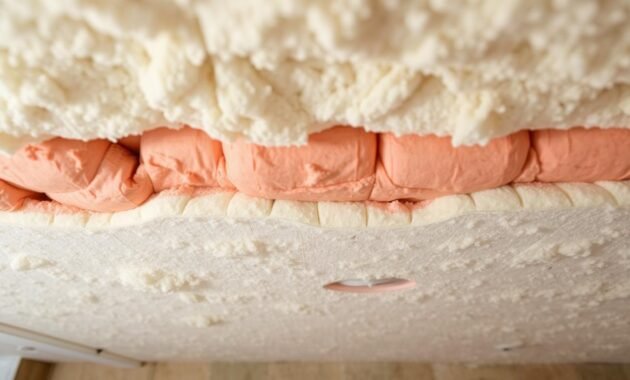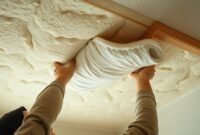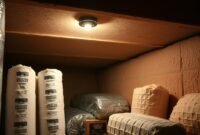As a homeowner, I know how key it is to keep my living space comfy and energy-smart. Insulating my basement ceiling has been a big focus for me. The EPA says I could save up to 15% on heating and cooling costs with the right insulation.
I’ve looked into many options, from fiberglass batts to spray foam and rigid foam boards. Each has its own good points and downsides. The goal is to pick the best one for my climate, basement, and energy-saving goals.
Read also: Does Spray Foam Insulation Reduce Noise?

Key Takeaways
- Basement ceiling insulation can significantly improve home energy efficiency and comfort.
- The best insulation options include fiberglass batts, spray foam, and rigid foam boards, each with their own pros and cons.
- Proper insulation serves as a thermal barrier, improving comfort, energy efficiency, moisture control, and noise reduction.
- Choosing the right insulation depends on factors like climate, basement conditions, and overall home energy goals.
- Insulating the basement ceiling can help lower energy bills and prevent mold and dampness.
Basement Ceiling Insulation Basics
Understanding the different types of basement ceiling insulation is key. You’ll find fiberglass batts, spray foam insulation, and foam board among the most common. Each has its own benefits and things to consider when installing.
Types of Basement Ceiling Insulation
- Fiberglass Batts: This affordable and widely available option is easy to install, but can be challenging to work around obstacles like pipes and wiring.
- Spray Foam Insulation: Providing excellent air sealing and insulation properties, spray foam requires professional installation and can be more costly.
- Foam Board Insulation: With high R-values per inch, foam boards may need additional structural support for the basement ceiling.
Common Installation Issues
Homeowners may face a few common challenges when installing basement ceiling insulation. These include air leaks, dealing with existing insulation, accommodating HVAC systems, and addressing moisture concerns. With proper planning and attention to detail, you can overcome these obstacles for a successful insulation project.
| Insulation Type | R-Value Range | Advantages | Disadvantages |
|---|---|---|---|
| Fiberglass Batts | R-11 to R-38 | Affordable, easy installation | Can be difficult around obstacles |
| Spray Foam Insulation | R-5 to R-7 per inch (open cell) R-6 to R-7 per inch (closed cell) | Excellent air sealing, high R-value | Costlier, requires professional installation |
| Foam Board Insulation | R-4 to R-7 per inch | High R-value per inch, versatile | May need additional support |
How Insulation Reduces Heat Transfer
Insulation is key to a cozy and energy-saving home, like basements. It acts as a thermal barrier, slowing heat transfer between your living area and the basement. This barrier keeps your home’s temperature steady, easing the load on your heating and cooling systems.
Read also: Should You Insulate Basement Ceiling?
Insulation tackles all heat transfer types: conduction, convection, and radiation. Conduction is direct heat transfer through materials. Convection moves heat through air or liquids. Radiation uses electromagnetic waves. By cutting down on these heat losses, insulation boosts your home’s energy efficiency and comfort.
The Environmental Protection Agency (EPA) says homeowners can cut their heating and cooling bills by 15% by insulating basements and attics. The U.S. Department of Energy (DOE) found that insulating a slab on grade can cut heating costs by up to 20% compared to insulating a basement ceiling.
Choosing top-notch insulation for your basement ceiling is a wise move. It creates a strong thermal barrier. This leads to better energy efficiency, lower bills, and a more comfortable home all year.
Why Insulation Matters for Basements
Insulating your basement is key for saving energy and controlling moisture. It can cut your heating costs by up to 20%. This helps keep floors above warm and cozy.
Benefits of Energy Efficiency
Insulating your basement can really lower your energy bills. Homeowners might see a 30% drop in utility costs. This is because insulation keeps the temperature steady, stopping heat loss in winter and heat gain in summer.
Preventing Moisture Issues
Insulation also helps manage humidity and prevent condensation, common basement problems. With the right insulation and a vapor barrier, you can block moisture. This protects your home from mold and mildew.
Getting your basement insulated is a wise choice. It boosts your home’s comfort, energy use, and durability. It tackles both energy and moisture issues, making your basement a better place for your family.
Key Factors Impacting Insulation Performance
Insulating your basement well is key. The R-value shows how well insulation works. A higher R-value means better insulation and more energy savings.
Understanding R-Value
The R-value depends on the insulation’s thickness and what it’s made of. Things like the material, how dense it is, and how well it’s installed affect the R-value. Picking the right R-value for your basement is important for good thermal performance and saving energy.
Choosing the Right Insulation for Your Basement
- Think about your local climate and your basement’s conditions, like moisture and temperature changes.
- Learn about different insulation types, like fiberglass batts, spray foam, and rigid foam boards. Know their R-values and how to install them.
- Check local building codes to make sure your insulation meets the standards.
- Look at the cost of each insulation option. Find a balance between how well it insulates and how much it costs.
Knowing what affects insulation and picking the right one for your basement can improve your energy efficiency. You’ll save on utility bills and enjoy a more comfortable home.
| Insulation Type | R-Value Range | Pros | Cons |
|---|---|---|---|
| Fiberglass Batts | R-13 to R-38 | – Affordable – Easy installation – Good thermal performance | – Can be affected by moisture – Requires careful installation to prevent gaps and compression |
| Spray Foam | R-6 to R-7 per inch (open cell) R-7 to R-8 per inch (closed cell) | – Excellent air sealing – High thermal performance – Moisture-resistant | – More expensive than other options – Requires professional installation |
| Rigid Foam Boards | R-4 to R-8 per inch | – High thermal performance – Moisture-resistant – Versatile installation options | – Can be more expensive – Careful sealing required to prevent air leaks |
Benefits of Insulating Basement Ceilings
Insulating your basement ceiling offers many benefits. It can lower your energy bills and prevent mold and dampness. A well-insulated ceiling keeps the floor above warmer and the basement cooler.
Lowering Energy Bills
Basements can lose up to 30% of a home’s heat. Insulating the ceiling is a wise choice. It keeps temperatures steady, easing the load on your HVAC system and saving energy.
This is very important for older homes in cold areas. They face long winters.
Preventing Mold and Dampness
Insulating the ceiling controls moisture and temperature. This stops mold and dampness. It keeps humidity levels in check, preventing mold and mildew.
This is key for a healthy, comfy living space.
Insulating also dampens sound, making your home quieter. With the right insulation, your basement becomes more energy-efficient, mold-free, and comfortable.

Top Insulation Options for Basement Ceilings
Insulating your basement ceiling has several great options. You can choose from cost-effective fiberglass batts to high-performance spray foam. Each type has its own benefits to keep your home warm and energy-efficient.
Fiberglass insulation is a popular choice. It’s affordable and easy to install yourself, perfect for DIY projects. It also helps block sound, great for basement rec rooms.
Read also: Will Fiberglass Insulation Burn?
Spray foam insulation is another excellent option. Open-cell spray foam seals well, improving insulation and sound dampening. Closed-cell spray foam is even better, acting as a vapor barrier and insulator.
Foam board insulation is water-resistant, helping prevent moisture and mildew. Some foam boards last long and need little maintenance.
Choosing the right insulation depends on cost, installation, and your space’s needs. Proper installation is key for comfort and energy savings. By comparing each option, you can pick the best for a cozy basement all year.
Fiberglass Batts for Basement Ceilings
Fiberglass batts are a favorite for insulating basement ceilings. They trap air pockets in fine glass fibers, slowing heat transfer. Easy to install, they fit well between joists and also block sound.
How Fiberglass Batts Work
Fiberglass batts are made of thin, flexible glass fibers. These fibers are woven into a mat. This creates many air pockets that stop heat from moving, making it a good insulator.
The air in the fiberglass acts as a barrier. It reduces thermal energy flow. This helps keep your basement at a comfortable temperature.
Pros and Cons of Fiberglass Insulation
- Affordability: Fiberglass batts are very affordable, costing $0.25 to $1.50 per square foot.
- DIY-Friendly Installation: They are easy to install, making them great for homeowners who want to do it themselves.
- Sound Attenuation: Fiberglass insulation can absorb sound, improving your basement’s acoustic performance.
- Potential for Moisture Retention: Fiberglass can absorb water, which can harm its insulating abilities and cause mold if not fixed.
- Less Effective Air Sealing: Fiberglass batts don’t seal as well as spray foam, allowing air leaks and drafts.
- Challenges with Obstacles: Installing fiberglass around pipes, wiring, and other obstacles can be tricky.
Fiberglass batts are a budget-friendly and easy-to-install choice for basement ceilings. But, homeowners should watch out for issues like moisture and air sealing problems.
Spray Foam Insulation for Basements
Spray foam insulation is a top choice for insulating basement ceilings. It comes in two types: open cell and closed cell. Each type has its own benefits for basements.
Benefits of Open Cell Foam
Open cell spray foam is lighter and cheaper. It’s great at filling gaps and creating a strong air barrier. It has an R-value of R2.5 to R4 per inch and is excellent at reducing sound.
Advantages of Closed Cell Foam
Closed cell spray foam has a higher R-value of R6 to R7 per inch. It’s denser and acts as a vapor barrier, keeping moisture out. It’s perfect for basement walls to prevent water and condensation.
Both types of foam are great at filling spaces around obstacles like pipes and wiring. The cost is between $0.50 to $3 per square foot. It’s best to have professionals install it for the best results and safety.
| Feature | Open Cell Spray Foam | Closed Cell Spray Foam |
|---|---|---|
| R-Value | R2.5 – R4 per inch | R6 – R7 per inch |
| Density | Lower density | Higher density |
| Air Barrier | Effective air barrier | Provides an airtight seal |
| Moisture Resistance | Limited moisture resistance | Excellent moisture resistance |
| Cost | More affordable | Higher cost |
Understanding R-Values in Insulation
When thinking about insulating your basement ceiling, knowing about R-values is key. The R-value shows how well insulation can slow down heat transfer. The higher the R-value, the better it is at saving energy and keeping your home cozy.
What is an R-Value?
The R-value is a number that shows how well insulation can block heat. It depends on the material, its thickness, and how dense it is. The higher the R-value, the better it is at stopping heat flow and saving energy.
How to Choose the Right R-Value for Your Basement
- For basement ceilings, you usually need R-values between R-11 and R-19. This depends on your area’s weather and building rules.
- Think about your local weather, energy costs, and comfort when picking an R-value.
- Keep in mind that insulation’s real performance can also depend on how well it’s installed.
Understanding R-values and picking the right insulation for your basement ceiling helps a lot. It makes your home more energy-efficient, lowers your bills, and makes your living space more comfortable.

Moisture Control in Basements
Keeping basements dry is key to stopping mold, damage, and lessening insulation’s power. It’s all about fixing water leaks, ensuring water flows away, and keeping humidity in check. The right vapor barrier is vital for managing moisture, but it must fit your climate and basement’s needs.
Importance of Moisture Control
In cold areas, vapor barriers on the warm side stop condensation in insulation. This prevents mold and keeps insulation working well. But in mixed climates, “smart” vapor retarders that let some moisture pass through might be better. They stop too much drying and damage.
Types of Vapor Barriers
- Polyethylene film: A common, cheap vapor barrier, but it can trap moisture and cause mold if not installed right.
- Rigid foam boards: They offer a solid vapor barrier and insulation, making them great for basements.
- Aluminum foil-faced kraft paper: This is more breathable, yet it helps control moisture.
- Smart vapor retarders: These membranes let some moisture through, preventing too much drying or trapping.
Choosing the right vapor barrier for your basement depends on your climate, humidity, and home’s build. Talking to a pro can help pick the best option for your basement’s moisture needs.
Dealing with Pipes, Wiring, and Ducts
Insulating around basement obstacles can be tricky. But with the right approach, you can do it well. For pipes, cut the insulation to fit snugly without squishing it. Use insulation sleeves for hot water pipes to keep them warm.
Insulating Around Basement Obstacles
When dealing with electrical wiring, never staple through or squish the insulation. Use insulation supports to make air gaps around the wiring. This ensures good airflow and safety. For ductwork, insulate it separately before adding ceiling insulation. This way, you avoid messing with the HVAC system.
Solutions for Tight Spaces
In tight spots, spray foam or cut-to-fit rigid foam boards work well. They fit the basement’s shape and seal well around obstacles. Always keep safety and clearance around electrical parts and HVAC systems in mind. With careful planning and detail, you can handle insulating around pipes, wiring, and ducts in your basement.


